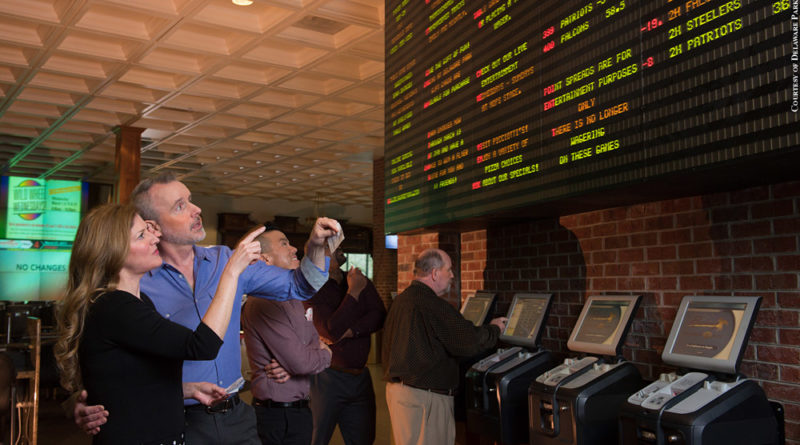On Election Day Nov. 3, Maryland voters authorized sports wagering in the state, with about 67 percent of voters saying yes to Question 2. The question simply asked whether sports wagering should be allowed in the state, with the tax money raised through sports betting going toward education.
The referendum did not specify what sports wagering would look like in the state. Instead, those details will be left up to the state legislature. The General Assembly will convene in Annapolis, Md., Jan. 13 and run for 90 days. Sending a sports wagering bill to Gov. Larry Hogan will be among the items on the agenda for the state Senate and House of Delegates.

Sen. Craig Zucker (D-Montgomery County) introduced a sports wagering bill that passed the Senate unanimously in March 2020. However, the bill didn’t make it to the finish line in the House before the pandemic hit, resulting in the simplified referendum on sports wagering for voters in November.
Zucker recently spoke with PressBox about his efforts related to sports wagering in Maryland and what’s to come in 2021.
PressBox: What do you think the passage of Question 2 means for Maryland?
Sen. Craig Zucker: I think it means that sports betting will be up and running sometime soon, and it gives Marylanders the opportunity to do it in-state and not have to drive across state lines to wager on sports. And it also means that tens of millions of dollars will be coming back to the state of Maryland that’s currently being lost and going to other states.
PB: You sponsored the sports wagering bill that passed in the state Senate. Why is this a topic that you’re passionate about? Is this something you’ve been working on for a while?
CZ: I think I can count on one of my hands the amount of times that I’ve actually gambled. Sports gambling in and of itself is not something I’m passionate about. What I am passionate about is making sure that we’re bringing taxpayer money back into Maryland and not losing it to other states and making sure [the] revenue that could be generated — that is currently going to other states — that we bring it back to Maryland and help fund things that we have shared values over like education. So that’s really where my passion is — making sure that we’re able to fund education and making sure that Marylanders have an opportunity to do something that they prefer in Maryland and not have to go elsewhere to do it.
PB: The state Senate and the House of Delegates made progress on sports wagering prior to the pandemic. Do you think the work that was done then could serve as a guideline for discussions in 2021?
CZ: I think so. We put a tremendous amount of work into the sports betting bill where we had work group meetings that were inclusive, where we had everyone at the table that wanted to be at the table. It was nonpartisan, and that’s why it passed unanimously out of the Senate. I feel like that’ll be a good starting point. That’s probably not where we’re going to end, but it’s a good starting point on the work we did last year and build on it and make changes where necessary.
PB: Do you think it’s important that wagering be allowed online, at bricks-and-mortar establishments or both?
CZ: I’m not a big gaming guy, but if I were to put my money down, I would definitely bet that there would be an online presence on sports betting. I would be hard-pressed to find any scenario where we wouldn’t allow online sports betting. I envision a scenario where we have online and bricks-and-mortar. Obviously, that’ll be part of the discussion that we have down the line, but there wasn’t much opposition to the online presence, which I think keeps up with other states — making sure we’re competitive with other states — and also making it accessible to people to do sports betting. And I also think we’re going to have it at your bricks-and-mortar places as well.
PB: If bricks-and-mortar establishments are given sports wagering licenses, where do you think Marylanders can eventually expect to be able to visit sports books in the state? (The closest sports books for most Marylanders are currently at Capital One Arena in Washington, D.C., and Delaware Park near Wilmington.)
CZ: I don’t want to get too ahead of where we’re going with the legislation, but the language that was in the bill initially that was passed unanimously out of the Senate included your race tracks and your casinos, so I definitely think that your casinos and your race tracks would be part of the conversation, and I see an opportunity for them to get these sports books. But obviously we’re going to have to have a broader conversation about who else should be included in that — like minority businesses — and figure out how we stay competitive with our neighboring states.
PB: Can you explain the tax rate on sports wagering and how that helps ensure that money stays in the state?
CZ: The tax rate that we passed out of the Senate was [a 20 percent tax on revenue], and I’m not sure if that stays. I think the tax rate, licensees and all that is yet to be determined. I think that is going to be part of the conversation, but we’re going to be guaranteeing that the additional revenue that’s generated from sports betting goes directly into the education trust fund — the Maryland General Assembly lockbox for education. Why is that important? It’s important especially with everything that’s happened with this global pandemic. The education trust fund is funded by gambling revenue. During COVID, the casinos were closed down. As a result, we lost $150 million in the education trust fund that we still haven’t made up. So any additional revenue we get from sports betting will be helpful. Based on what we did a couple years ago, by passing legislation that went to the voters to require a constitutional amendment that guarantees that additional gaming revenue goes to the education trust fund, I feel more than confident — it’s guaranteed — that we’re going to have more money [directed] toward education.
PB: Does that 20 percent tax rate still make sense for Maryland, or has your opinion changed at all about what the tax rate should be?
CZ: I think the tax rate is going to be a part of the conversation. I feel like we need to make sure we’re competitive with our neighboring states and jurisdictions around us that have sports betting. But I think that’s going to be part of the ongoing conversation.
PB: Is there a state out there that represents a really good model for Maryland regarding sports wagering?
CZ: We’re looking at all the states. The longer it takes for Maryland to get up its sports betting, the further along other states will be. I’m assuming in the next year or so, half the country will allow sports betting. But I think we’re going to be looking at all the states in terms of what they did right and what they did wrong — and pay in particular close attention to those states that neighbor Maryland to make sure we’re able to be competitive with them. Our competition isn’t necessarily New York State. We’re losing Marylanders not necessarily to New York State but those that are closer to Maryland, so we’ll be looking at all that closely.
PB: What’s your hope in terms of a realistic timetable to be able to bet on sports in Maryland?
CZ: My hope would be to have it up and running sometime over the summer. I think the Maryland State Gaming and Lottery Commission can start working on [regulations] now. We figure out a good, fair, competitive sports betting bill that we pass. And then we’ll have the regs in place, and we just get it up and running as quick as possible. We’re going to be meeting virtually. We’re going to make sure that we have everybody at the virtual table. It’ll be inclusive and transparent. We’re hoping to get the best piece of legislation that will really benefit Marylanders and be competitive with our neighboring jurisdictions.
Photo Credit: Courtesy of Delaware Park
Issue 266: December 2020 / January 2021
Originally published Dec. 16, 2020

